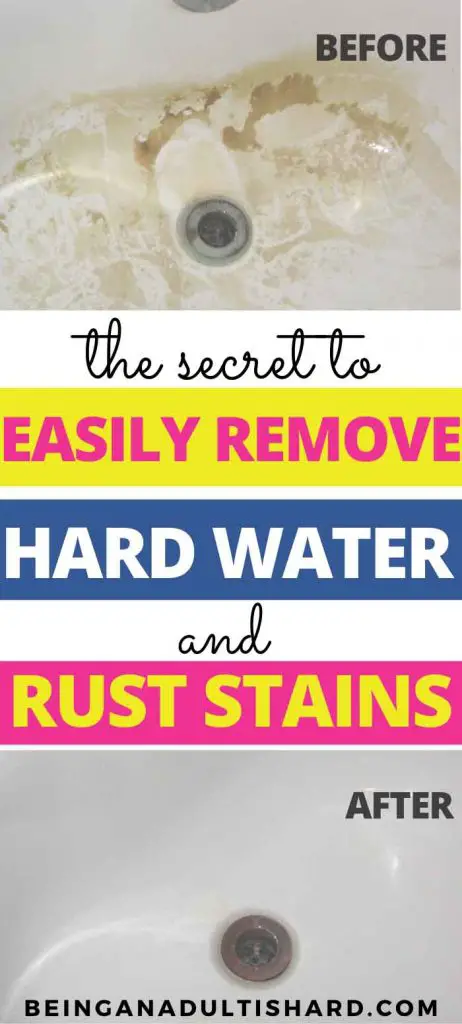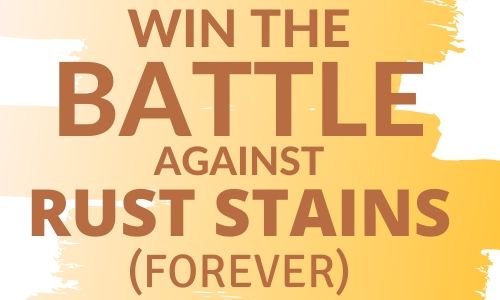Did you know there’s an easy way to remove rust stains from a bathtub, toilet or sink? I did some research (because we have well water) and found that most commercial rust removers use citric acid to break down the rust, but they also contain harsh chemicals. Citric acid is the secret house cleaning ingredient you need to remove orange rust stains.
Unsightly rust stains can also develop in toilets and on sinks due to the iron in water. Learn what causes rust stains and how to get orange rust out of bathtub naturally to win the battle with those stubborn rust stains for good.
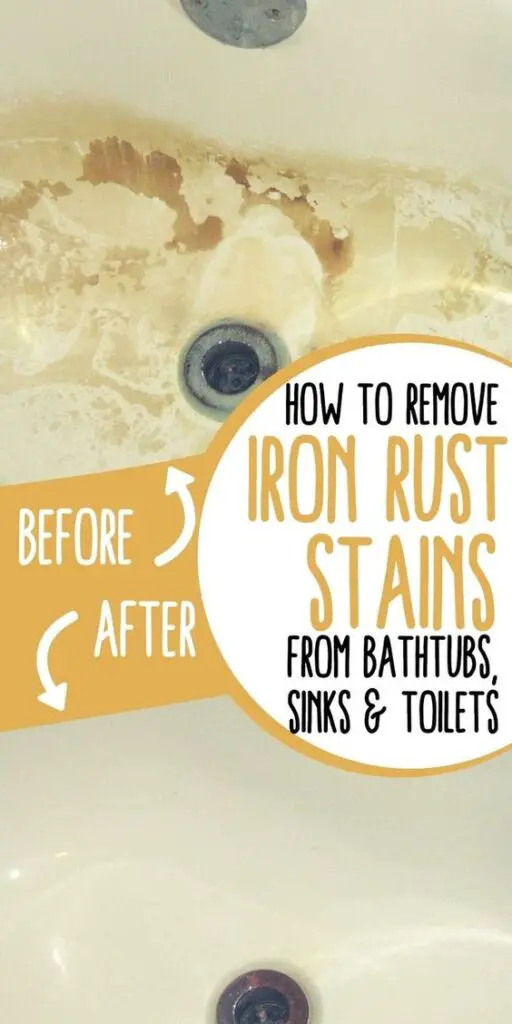
What causes orange rust stains on tubs?
You may be one of the more than 13.5 million American households that rely on private wells for drinking water. Despite the budget savings of having unlimited access to water with no monthly water bill, the biggest downfall of relying on a hard water well is the inevitable brown patches caused by rust and mineral deposits.
Or you may be receiving municipal water and the water supply may also be from groundwater. This can also lead to the same hard water issues, with the added bonus of having to pay for it.
Groundwater is pumped from aquifers found below the earth’s surface. The aquifers collect groundwater through rain and melted snow that flows underground through rock, sand and soil. Minerals like calcium, magnesium, lime, and iron dissolve into the water as it flows, resulting in hard water – water that has a high mineral content.
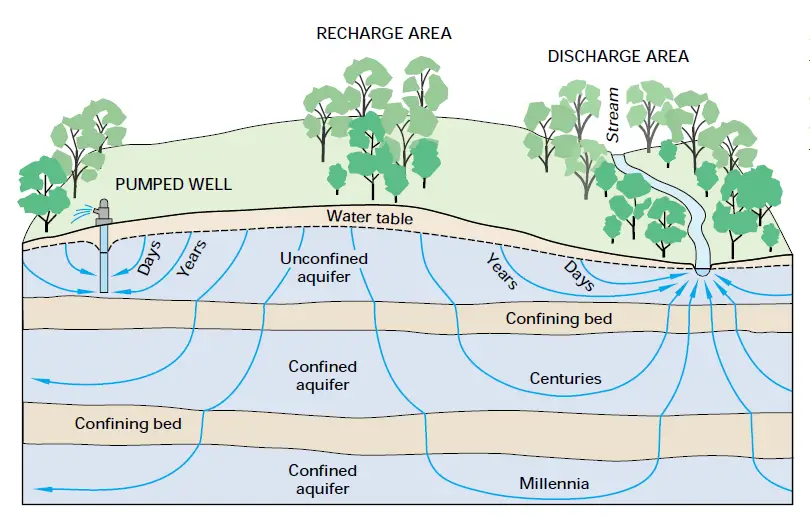
RELATED POST: 33 Awesome cleaning hacks for lazy people
The iron becomes oxidized when exposed to air and can leave reddish/orangish/brown stains on bathtubs, toilets, sinks, shower walls and glass doors. Many homeowners find it difficult to remove the rust stains from bathrooms as these stains do not respond to normal cleaning products.
Iron water stains can appear on your clothes as well, especially whites, making them look yellow and dingy.
As an Amazon Associate I earn from qualifying purchases. This means if you click on a link and buy something I’ve recommended, I get a small commission at no additional cost to you. You can see my full Disclosure Policy here.
RELATED POST: How to clean a really messy room fast
How to get rid of rust stains in bathroom

Citric Acid is the natural rust stain remover for bathtubs, toilets and sinks. It’s also effective for removing hard water mineral deposits. It is a safe, natural, non caustic, environmentally friendly, biodegradable solution to the problem of rust stains and hard water deposits.
Citric acid is a weak organic acid that is found naturally in citrus fruits. The acid gives citrus fruits their sour taste and is most concentrated in lemons and limes. Pineapple and berries also contain minimal amounts of citric acid.
Citric acid works by softening hard water and dissolving the minerals that cause staining. It also lowers the pH levels of bacteria, removing mold, mildew, and bacteria. It’s a safe and effective choice for your family, your pets, your plumbing and your septic system (if you have one).
Citric acid is effective as a solvent to remove stains from toilets, sinks and tubs as it dissolves the alkaline minerals that cause rust and hard water deposits on the surface of your tub.
Synthetic food grade citric acid is commonly added to processed and packaged foods as a preservative as its acidity prevents bacterial growth. It is also used to give certain foods and beverages a sour taste.
Alternatives to citric acid to remove rust from a bathtub
Most types of acid and a little elbow grease can remove rust stains from bathrooms. If you’re looking for a natural solution, white vinegar or lemon juice can also be effective. However, you may need to add an abrasive such as baking soda to scrub the rust.
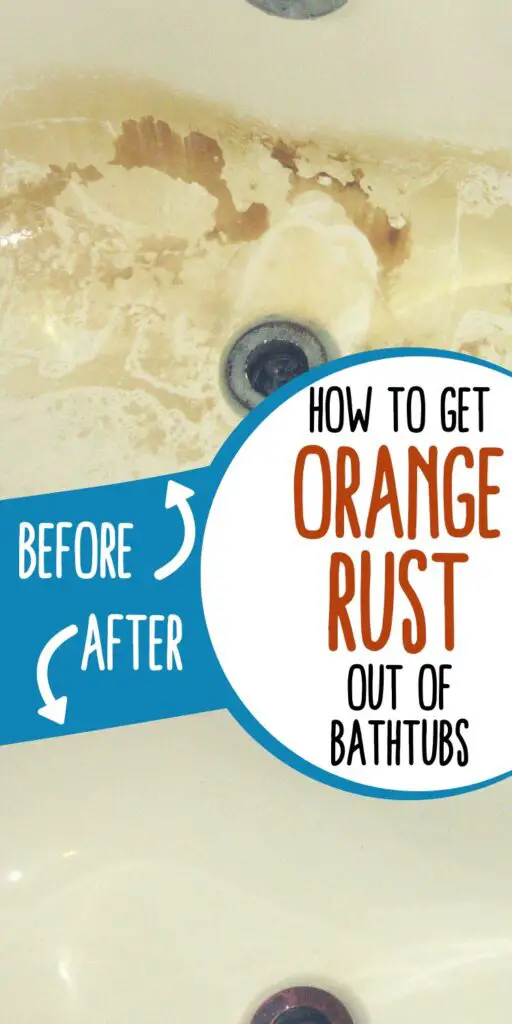
RELATED POST: 21 Unbelievable Cleaning Uses for Citric Acid Powder
How to remove rust stains from tub
To remove rust stains on bathtubs simply dissolve 2 tablespoons of citric acid into a spray bottle containing hot water. Shake the bottle to dissolve the citric acid, and spray your bathtub generously with the mixture. Don’t forget to spray the walls, tile or glass doors if they are also stained.
You can add a drop or two of Dawn before shaking to help the mixture stick to the vertical surfaces. Another way to ensure the mixture stays on stubborn stains is to soak a paper towel with the mixture and leave it on the heavily soiled area. Or you could make a paste of citric acid powder and water and apply it to the area.
Let it sit for 5 or 10 minutes and then simply wipe the rust stains away! Light stains may not even require wiping, just rinse them right off with water. The solution is also effective for removing scum from stainless fixtures and leaves them looking shiny and new.
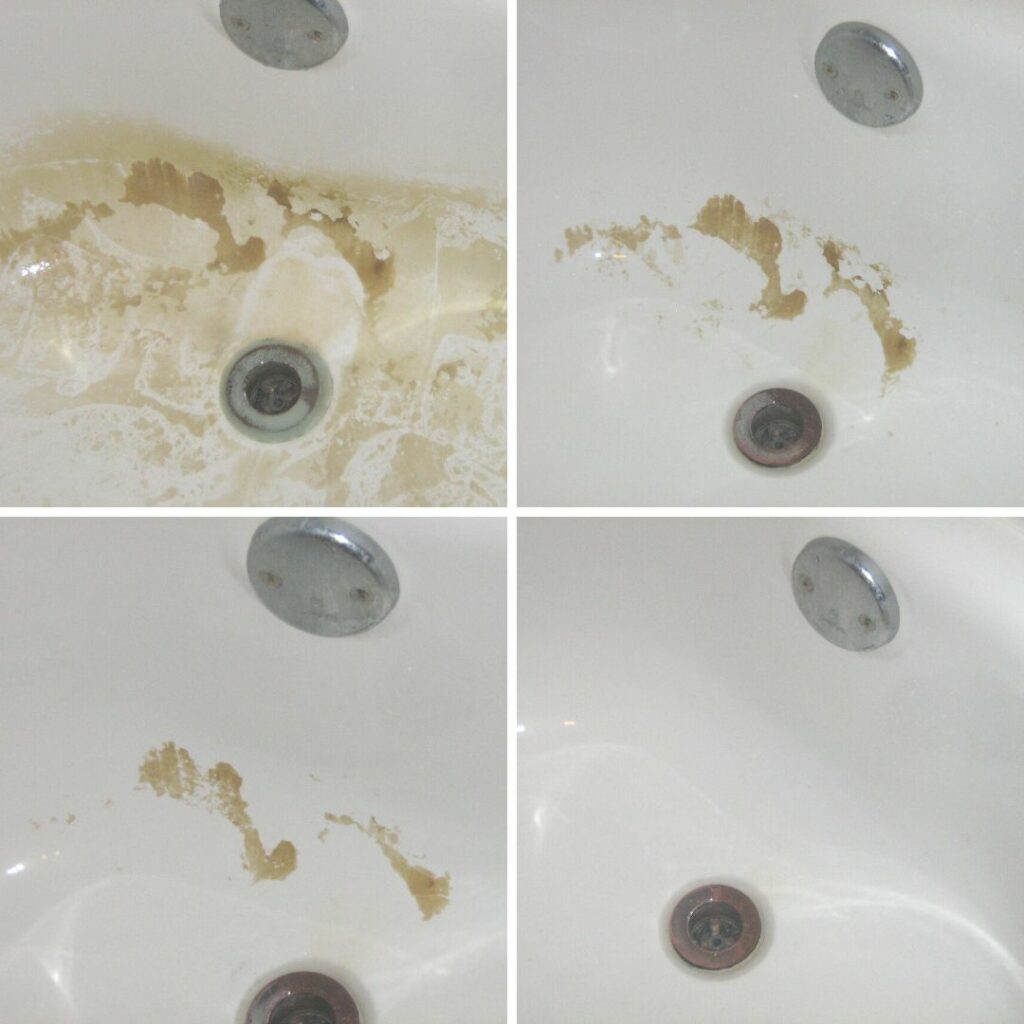
Stubborn rust on bottom of bathtubs may require two or more treatments, depending on how long they’ve been there. The picture above required 3 treatments and some scrubbing with a stiff brush to get rid of the rust stains in the tub.
Note that citric acid can irritate sensitive skin and eyes. I recommend using gloves if you have sensitive skin and only using in a well ventilated room.
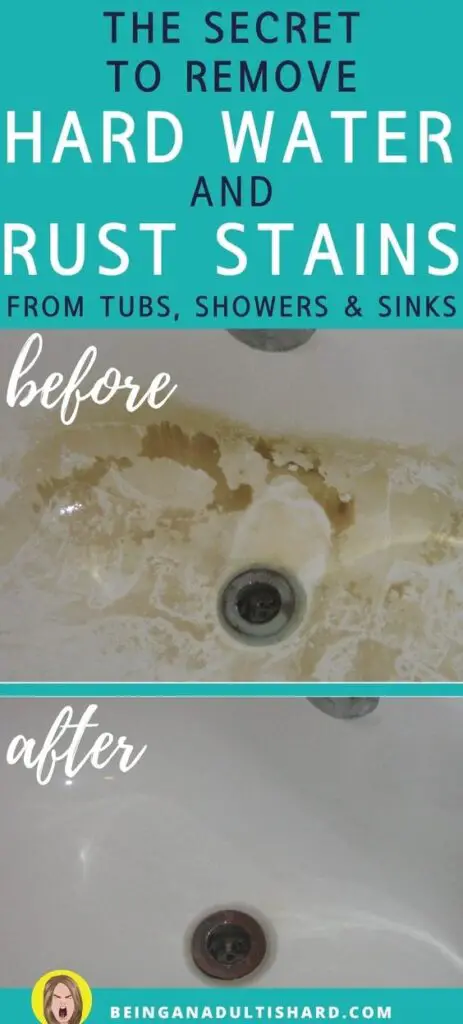
RELATED POST: How to make all purpose cleaner
How to get rid of rust stains in shower
Citric acid is also effective at removing rust stains from fiberglass showers and tile showers. To keep glass shower doors as clean as hotels do, use the same method as for removing rust stains from bathtubs, but add a teaspoon of Dawn dishwashing soap before shaking the spray bottle. This will create suds that will help the solution stick to the vertical wall surfaces and is safe on grout.
To prevent rust stains from building up, spray citric acid mixed with water lightly on walls, tile and grout regularly after showering. Use a squeegee on glass shower doors after every use to prevent buildup.
RELATED POST: The Easy Way To Clean Glass Shower Doors With Hard Water Stains
How to remove rust stains from toilet bowls
You can use the same mixture to remove rust stains in toilet bowls. If the method above doesn’t work to remove rust stains from your toilet bowl, try turning off the water supply and flushing the toilet to empty the bowl. Pour a solution of 1 1/2 cups of citric acid mixed with a bucket of very hot water into the empty toilet and let sit for 20-30 minutes.
After waiting, scrub the toilet bowl vigorously with a toilet brush, paying particular attention to the rim and the drain near the s-trap. If the toilet brush alone doesn’t remove all the stains, try using a pumice stone with a handle to remove any remaining stains. Don’t forget to turn the water back on when you’re finished.
For a more detailed step-by-step process, see How to Clean Toilet Bowl Stains.
RELATED POST: 53 Hydrogen peroxide hacks you need to know
How to remove rust from toilet tank
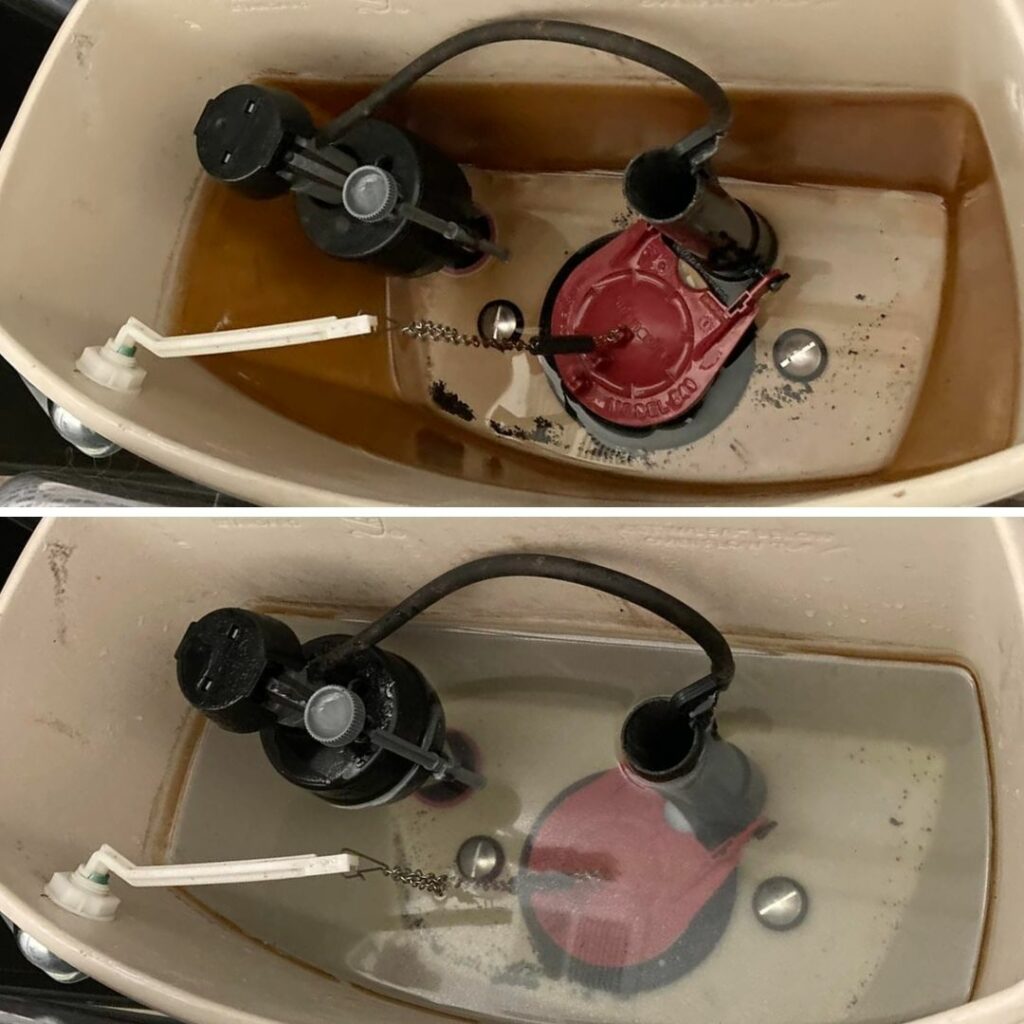
When you have hard water, toilet tank rust can build up. When it builds up, it can eventually cause a stubborn rust ring in the toilet bowl. To clean toilet tank rust, turn the water valve off and flush the toilet until it’s empty. Fill the rusty toilet tank up with hot water and add 1 cup of citric acid.
Let it sit for 20-30 minutes, then turn the water back on. Then flush once or twice. You will be left with a practically new toilet tank!
How to remove rust from sink
You can use the same 2 tablespoons of citric acid in a spray bottle full of hot water. Shake and spray your sink. Make sure you spray the fixtures and underneath the faucet if you want shiny fixtures that are free from hard water deposits. Let sit for 10 minutes or so, then rinse with clean water.
To get rid of rust stains in your sink, fill the sink up with hot water and add 1/4 cup of citric acid to the water. Stir to incorporate the citric acid into the hot water. Let the solution sit in the sink for as long as possible to dissolve the stains, then rinse. You may have to scrub a little or repeat the process if you have particularly bad spots.
How to prevent rust stains
To prevent rust stains and mineral buildup, it’s best to keep your showers, bathtubs, and sinks dry and clean. Be sure to spray them with a solution of 2 tablespoons of citric acid to a half gallon of water after every use.
Let it sit for a few minutes and then wipe all surfaces dry. If hard water sits long enough to dry, evaporation will result in more mineral buildup and rust stains.
If this seems like too much work, you may want to look into getting a water softener to eliminate the hard water issue entirely. The Whirlpool WHESFC Pro Series – Softener/Whole Home Filter may be the solution for you.
This water softener and whole home filter system is reasonably priced, prevents scale from forming in your home’s pipes, and leaves less residue on appliances that use water such as dishwashers and washing machines. It is a maintenance-free unit that doesn’t require new filters. All you have to do is add salt as needed. Click on the picture above to get more information and to see customer reviews.
Do you know of any other frugal and natural solutions to remove rust and hard water stains from bathtubs, sinks and toilets? Let us know in the comments.
